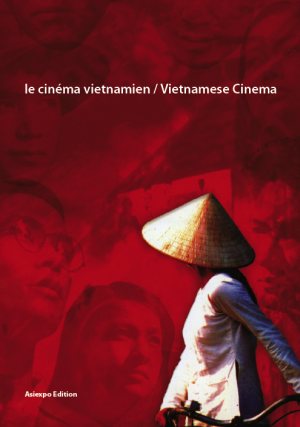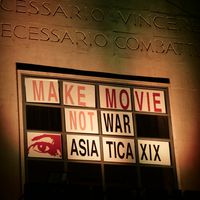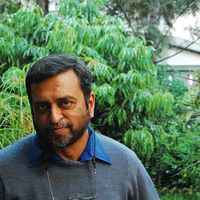Asiexpo: From Festival To Books

This month, SEA-Images meets with Jean-Pierre Gimenez, the director of Asiexpo Association which organises the Lyon Asian Cinema Festival, one of the oldest of its kind in France.
How was Asiexpo created and how did it come to organise a film festival in Lyon?
Asiexpo was at first a small team of four friends who are fond of Indian culture. Soon we came up with the idea of organising a film festival and presenting Indian films to the public. With the help of the Indian Embassy and some distributors, we gathered a few prints and showed them in Lyon. In the first years of the festival, we screened only Indian films. After three editions, several new members joined our association, and we decided to open to other Asian countries such as Japan and China. For the fourth edition, a specialist of Japanese animation film came on board. So every year with new people joining us, the festival kept growing and extending.
As the oldest festival in France dedicated to Asian cinema, you may have noticed the rise (and maybe the fall) of interest in this cinema in your audience?
Since we did not know much about organisation of festival in our early years, we had to limit our choice to films that were available in France with French subtitles. We soon felt that in order to get attention and recognition, we had to go beyond showing classics such as Akira Kurosawa’s and Satyajit Ray’s works. So we started to build a network in other countries, and then, we started to receive entries from Asia. An important turning point arrived when I started to go to Cannes where I could meet in person those with whom we had been in touch by phone or email. I could explain about our festival to them more extensively. So we were in a better position to get films from them. It was from 1999 to 2002 that the festival reached its peak in terms of audience and quality of the films. We also discovered many directors in this period. Asian cinema was really refreshing and surprising to the audience.
Asian cinema lovers who had access only to low-quality VCDs at the time were attending the festival in great numbers as they were eager to see the films in better conditions and on a big screen. But with on-line DVD sales and illegal downloading, this audience almost disappeared. Now our main goal is to present films that are not available on any forms on the Internet. To attract this specific audience, we have to be able to show brand new films that have never been shown anywhere. We also need big names in order to attract more audiences, but it is hard to compete with other bigger festivals. So we have to find a balance between independent films and big names in our programming to be able to reach different audiences – the manias and the ‘normal’ public. For the last two years, we have been programming more smaller films than big names.
Have there been any milestone years in these 13 years of festival?
One of our best years was when Korean actress Moon Sori came to present the film Oasis.
Another one is when director Hiroshi Toda came for the first time in 2006. One interesting thing about Hiroshi Toda is that he is also the director of a psychiatric clinic. His works are at once very original and universal, just like classics by Ozu.
The originality of Asiexpo is that it not only presents films, but also organises a lot of side activities.
Exactly. Each of our members has knowledge in a different field, and is ready to offer a bit of their time. In other words, we possess different resources for various things. Twice a month, we organise Asian Cineclub that presents films that are soon to be released. We organize another gathering, 100% Manga Evening, which shows Japanese animation films. Our association also offers language courses, and boasts a very active website. We just launched an online bookstore that specialises in Asian cinema and rare and sold-out books. We try to compensate our lack of financial resources with new ideas. Lately, we started to publish books and launched a collection entitled “Asian Connection”. So far, we have published two books, each of which comes with a DVD of interviews. The first one is on Thai cinema, and the other, on Vietnamese Cinema. These books are bilingual, in French and English. Our aim is to publish reference books, and we are focusing on subjects that have not been much covered. These books are collective works with 15 to 20 contributors coming from different backgrounds: French, British, American, Locals, university researchers, journalists, as well as producers, directors and ordinary cinema-goers. Each of the contributors offers an article of 1 to 20 pages. We sold more than 700 copies of our first book, which is encouraging. We also started DVD self-publishing with Snow in Spring by Hiroshi Toda, the winner of Asiexpo festival 2006. As for the language matter, we apply the same principle on our DVDs – i.e. films and bonus tracks are subtitled in French and English.
The latest book that you published is on Vietnamese cinema, which is not so well known and of which sources of information are rare. Which other titles are you preparing?
We have just found out that we have very poor sources of information on this cinema. All we have is an encyclopaedia of Vietnamese cinema, a few books on the cinema during the colonial period and some works on the Vietnam War represented in cinema.
Our next two books will be on Indian cinema -- one will be a general introduction, and the other will be more like a guide on how to interpret and decrypt Bollywood cinema. We are also planning to start a book on Taiwanese Cinema, and later on, one on Philippines Cinema.
Your next edition will start in a few weeks. Do you have some announcements for our readers?
This coming edition will be very special for us as Korean actor Choi Min-sik will be the godfather of the festival. He will stay in Lyon for 3 days and introduce five of his films, including his first one. We will also celebrate the 10th anniversary of Indiestory, a production company specialised in short films, art-house features and animations. We will also have a retrospective on Bollywood cinema with 14 films, from the 50s till now. Om Shanti Om, one of the latest successes in India, will open the festival.
Asiexpo website: http://www.asiexpo.com/festival/
Asiexpo Online Bookstore: http://www.asiexpo.com/boutique/
Similar content
By Kerrine Goh
28 Jun 2006
By Kerrine Goh
29 Sep 2011
posted on
08 Mar 2011
By Jérémy Segay
27 Jan 2006



